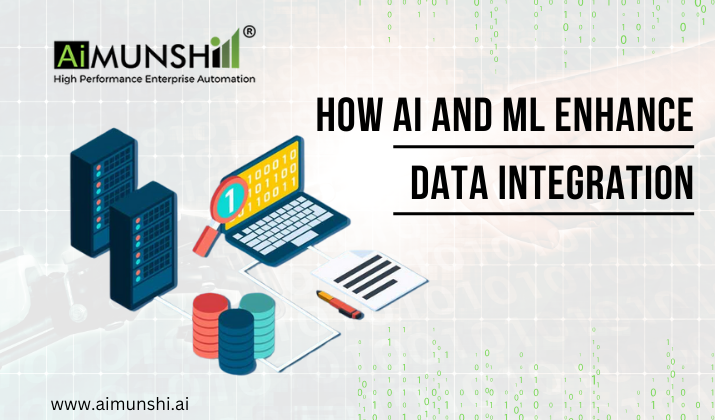
How AI and ML Enhance Data Integration
In the ever-evolving landscape of data management, Artificial Intelligence and Machine Learning are reshaping how businesses handle data integration, making it more efficient and accessible for business users. This blog explores how AI and ML capabilities revolutionize data integration processes, driving better decision-making and operational efficiency.
AI Capabilities to Simplify Integration
Modern data integration technologies are increasingly incorporating AI capabilities to meet the growing demands of enterprises. These AI enhancements change how businesses make decisions by automating complex processes and providing deep insights into data.
Prebuilt Mapping and Metadata Catalogue
One of the significant AI capabilities in AiMunshi is the use of prebuilt data integration templates and system metadata catalogues. AI can automate data transformation mapping creation, enabling business users with minimal technical expertise to utilize DI tools through a simple drag-and-drop interface. This allows more time for data analysis and trend identification using their domain knowledge.
Fast Computational Speed
AI and ML significantly enhance the computational speed of data integration processes. By leveraging adequate input parameters, ML can decipher business insights from enterprise datasets faster and more efficiently than traditional business intelligence (BI) techniques. ML's fast computation power and minimal coding requirements help achieve speed objectives, allowing businesses to respond quickly to new data.
Big Data Processing
One of the standout features of ML in DI is its ability to efficiently process large volumes of data. Traditional DI tools struggle with the speed required to handle big data, especially when dealing with unstructured or semi-structured formats. AiMunshi uses ML to parse through big data structures of all formats, generating accurate data models and pipelines with minimal human intervention.
Autonomous Learning and Intelligence
AI's ability to automate data transformation mapping in the ETL process allows business users to focus more on identifying patterns and hidden trends from curated datasets. This autonomous learning capability of AI helps in deriving accurate business insights by applying statistical modeling to the data.
The Case for Embedded Recommendation Engines
Another notable AI/ML-driven improvement in the DI space is the embedding of recommendation engines within integration platforms. These engines automate the data integration process by utilizing metadata analysis from large corporate datasets. They recommend the best-fit data pipelines by performing graph and cluster analysis based on data access patterns across different enterprise applications. This inline technology maximizes business user involvement in the data integration process by automating the creation of data pipelines.
Advantages of AI and ML in Data Integration
AI, combined with ML techniques, addresses complex data integration challenges. For instance, traditional methods often struggle with large volumes of data from diverse sources, such as streaming and IoT. AI and ML not only solve these processing issues but also enhance integration flow.
Optimization and Efficiency
AI optimizes data integration platforms by simplifying development lifecycles, reducing learning times, and lowering dependency on highly skilled personnel for ETL workflow creation. ML can train datasets for statistical modeling configurations without manual intervention, thus reducing human errors.
Cost and Time Reduction
Integrating AI into DI platforms reduces total ownership costs and integration timelines. It empowers business users to perform DI tasks with minimal or no technical assistance. Pre-packaged and configurable data integration templates, combined with intuitive and self-guiding steps, streamline deployment and application tasks.
Enhanced User Experiences
AI provides conversational user experiences, enhancing efficiency by assisting in integration procedures and querying platform operational states. This enables business leaders across various departments to independently create data structures and applications tailored to their specific curation and analysis needs.
AI-Enabled Decision Making
AI-infused data integration is gradually automating organization-wide application flows and data pipeline creation. With the rise of big data storage solutions, DI tools like AiMunshi can access large volumes of diverse data, using embedded recommendation engines to intuitively infer data structures. This automation reduces repetitive and redundant DI tasks, allowing business users to leverage their domain knowledge for extracting valuable business insights.
Conclusion
AI and ML are transforming data integration by automating complex processes, improving computational speeds, and enabling deep data analysis. Platforms like AiMunshi are at the forefront of this revolution, providing businesses with powerful tools to manage data integration efficiently. By simplifying workflows, enhancing data quality, and enabling predictive analytics, AiMunshi empowers organizations to harness the full potential of their data, driving informed decision-making and operational success. The future of data integration is here, and it is powered by AI and ML.
Archive

